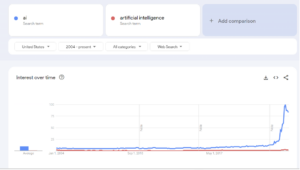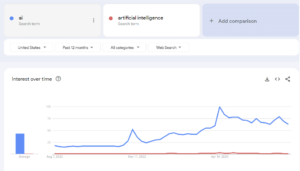When someone comes to your website, they’ll likely find the reviews, awards, case results, and testimonials you’ve set up to showcase so they can learn about your level of service and ability to provide top-tier legal services. If your business is using cutting-edge case management software or an established internal organizational system such as EOS, you likely won’t be featuring this above the fold unless you’re B2B and representing businesses that are fanatical about aligning on technologies and management philosophies. The same goes for Artificial Intelligence. Just like if you ask me “What’s in it for me if you’re using AI at your agency?” it translates to fewer people hours going into your account, and in the B2C space, going into your case.
Let’s take a step back from the average person for a moment and consider what AI has likely meant to them so far this year. Google Trends has this to say about the buzzword that’s still trending:
A Survey About AI
I always ventured to guess that many consumers believe AI is not an acronym for Artificial Intelligence but instead, the computing phenomenon we are witnessing in general. Maybe I should conduct a survey for that alone. There is, however, a survey we conducted recently via Survey Monkey (moving on from MechanicalTurk due to quality issues) of 150 people in the US and their thoughts on AI.
On a scale of 1-10, how much do you believe Artificial Intelligence (AI) has improved Google Search Results?
Average Number: 5.07
According to our participants, they were just about completely neutral about AI improving Google Search. Even with the rollout of Bard (and other comparable AI plays on search engines), there doesn’t seem to be widespread adoption or even acknowledgment just yet.
Please answer only “Yes” or “No” – Have you heard of ChatGPT?
Yes: 43%
No: 57%
Perhaps the participants aren’t in college generating term papers on ChatGPT just yet – less than half of respondents have heard of the breakthrough AI phenomenon of ChatGPT. If you haven’t either, just know that you aren’t the minority in this question.
The next round of responses is keyed into different ways the average person has been interacting with AI/ChatGPT and how much of an influence they believe it’ll have on search options in the next few years.
Please answer only “Yes” or “No” – Have you used ChatGPT to ask for information on a local service?
Yes: 12%
No: 88%
On a scale of 1-10, how much do you believe advancements in AI have influenced Google searches up until this point?
Average Number: 5.32
On a scale of 1-10, how much do you believe advancements in AI will affect Google search results in the next 2 years?
Average Number: 7.04
On a scale of 1-10, do you feel that AI is being used to create content on websites more than usual nowadays?
Average Number: 6.47
It may have been pretty obvious, but the enthusiasm toward AI is significantly greater for businesses than it is for consumers. I’d venture to guess that after several years of losing faith in search engines and social platforms because of internet trolls and misinformation, AI is just another deterrent in an individual’s desire to get reliable, trustworthy, and human-generated information.
How can we see this as an opportunity to provide human-generated content and ideas when it seems counterintuitive due to search engines creating their own AI component to search? There are a few things to consider for reestablishing trust with people and potentially creating positive rapport with search engines as AI continues to flood websites with mediocre webpages and blogs.
What Are the Implications of EEAT as AI Continues to Take Hold?
Towards the end of 2022, Google updated their infamous EAT standards to include another E: Experience. Before, it was Expertise, Authoritativeness, and Trustworthiness. The additional E now means we have Expertise and Experience, and we’re probably all wondering what the difference is.
In its most simple form, this E refers to “knowledge or skill gained through exposure to a particular activity or event.” Everything about Generative AI content is the antithesis of what EEAT is, so finding examples of properly implementing a degree of EEAT both sitewide and within individual posts will likely be more and more important in upcoming years.
What Can Be Said About Storytelling/Anecdotal Content?
To segue into storytelling and anecdotal content, again, any real experiences from AI would be completely fabricated. People connect with stories quickly because they are engaging and relatable. Patrick Lencioni, a famous business development coach, and best-selling author, has spent much of his career weaving “business fables” to take basic concepts and make them overly digestible by creating an immersive and realistic fictional setting and delivering his acumen from dozens of different angles and repurposed conversations.
How Do We Refresh Existing Content to Differentiate ChatGPT and Other AI Content?
Strong content continually evolves, especially when the concepts presented evolve as well. Accident statistics change every year, along with medical procedure success rates, rural/urban population ratios, traffic stop numbers, etc. While AI makes it extremely easy to include these objective facts, it is important for us as curators of expert information on our website to be consistent with what we are representing.
Contact Market My Market for Your Marketing Needs
From best-in-class human-driven content to expert SEO, Market My Market can help your business stand out. Our knowledgeable writers and SEOs have a depth of experience helping businesses like yours gain valuable leads through innovative copy and top-of-the-page search results. To discover how we can help you take your business to the next level, contact us at (866) 270-2250 or complete our contact form today.

The ongoing digital revolution is transforming the way that all businesses interact with clients and customers. Consumers rely heavily on digital channels for researching products and services and expect to make buying choices with the swipe of a finger. For organizations that want to remain competitive, having a defined digital marketing strategy and execution plan is essential for successful outcomes. With a demonstrated history of creating and implementing strategic digital marketing initiatives that drive growth, I am committed to delivering real, measurable results for my clients.


